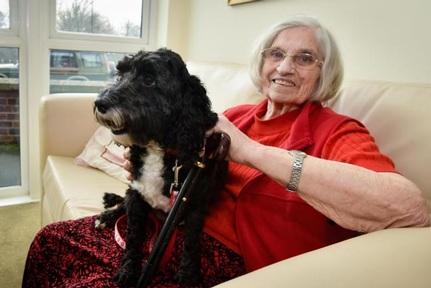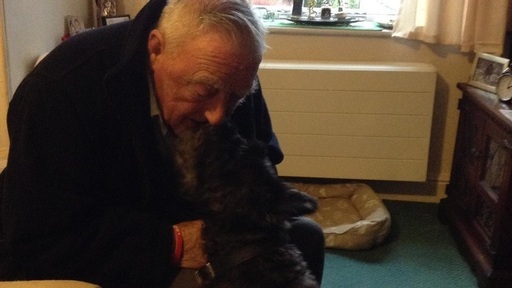Thousands of animals are put down every year when their owners move to a care home
Going into a care home can be extremely hard and for some it means leaving a home where they have lived all their lives and saying goodbye forever to their beloved pet, who has become their closest companion.

Thousands of animals are put down every year and over 100,000 have to be rehomed, due to their owners having to give them up when they go into residential care, according to research by care provider Anchor. This can be deeply traumatic for both the owner and the animal.
However this is not always the case, with the leading reviews care home site, carehome.co.uk, revealing that 43 per cent (8,081 out of 18,961) of care homes in the UK are pet-friendly care homes.
Coverage Care in Shropshire runs pet-friendly care homes. Its chief executive, David Coull, recently called for all care homes to have clear policies in place, regarding pets.
He says: “Moving into care is a life-changing decision and it can be stressful so anything that can allow it to be a smooth transition should be welcomed. It would make it easier for people to choose the best place for them to live if every care home had a clearly stated policy.”
Huge benefits to keeping pets
Mr Coull believes there are huge benefits to residents being able to keep their own pets and says: “We are happy to accept pets in our homes under most circumstances and work with potential residents so, wherever possible, they can bring their animals with them and they know what we expect from them in terms of their responsibilities as pet owners and neighbours.”
With a quarter of older pet owners describing their pet as ‘family’, the animal charity Blue Cross wants care homes to clearly display on their website and publicity material whether they accept pets.
Owners suffer 'intense grief'
The charity’s Pet Bereavement Support Service reveals it receives calls from elderly owners who can suffer intense grief when they are forced to part from their pets.
Diane James from the Blue Cross Pet Bereavement Support Service says: “Calls from older people forced to give up their pet because they are going into a care home are heartbreaking.
“Not only are pets an important companion in older people’s lives, they may also be the last link to a deceased spouse or happy memory. At an already difficult time for many older people, losing their pet can be seriously traumatic for them.”
As well as companionship, pets can give older people a routine and a sense of purpose. Older pet owners are also more likely to take exercise to walk or play with their pets and pets also relieve stress and increase endorphins through stroking. Animals give unconditional love and affection which can help to boost self-esteem.
Care home resident threatened with eviction
The whole issue of pets in care homes has been in the media of late with Burnfoot Coach House care home in Lockerbie, Scotland serving an eviction notice on 87-year-old resident, Bob Harvey, after he refused to get rid of his dog Darkie.

Over a quarter of a million people have now signed a petition for the care home to let Bob keep his dog and a crowdfunding page has raised over £35,000 to pay for a pet-friendly care home.
Bob Harvey has lived at the care home for four years but new management has changed the rules and brought in a new no pets policy. Michael Best, managing director of Mead Medical Services Limited, which runs the home, claims the dog is unhygienic, a trip hazard and has fouled the hallways and grounds of the home.
Mr Harvey said the decision has left him 'heartbroken and unable to eat or sleep'.
Extra work for care workers
Accepting pets in care homes can cause extra work for care workers who are already busy enough as it is, which is why it is crucial that care homes have clear policies in place.
There are issues that need to clarified such as who will clear up the dog mess or the cat’s litter tray, who will pay for the vet’s bills and who will look after the pet when the resident dies.
Anchor which has 121 care homes and 48 extra care housing has a pet policy which has been written with the help of good practice guidance produced by the RSPCA, The Dogs Trust and Age Concern.
Rob Martin, head of Care Quality at Anchor, says: “Anchor prides itself on giving older people a choice of great places and ways to live. One way we do that is by allowing residents to bring their pets with them when they move into our properties. Pets are like members of the family and studies have shown that residents are healthier and happier when they interact with pets.
“As well as reducing stress, having pets is also a good way for carers to initiate conversations with residents, particularly those living with dementia who find it difficult to communicate.”
Pam Heywood, aged 88, moved in to Anchor’s Millfield care home with her male cat Sam, in October 2012. Ms Heywood has had Sam, a rescue cat, for six years. Sam never ventures out but likes to wander around the home.
'It was everything to me that Sam could move in with me'
Ms Heywood, who chose Millfield because they accepted pets, said: “It was everything to me that Sam could move in with me. He’s my best mate. I would be so miserable if he couldn’t have come with me.
“He loves all the fuss that everyone gives him.”
It is a similar story at Sunrise of Esher care home in Surrey. Esher resident Catherine Healey has had her black and white cat Huffy for 18 years. He has the full run of the care home as well as his own cat flap.
Ms Healey says: “I have known him a very long time and he makes me feel like I have someone to look after, which makes a huge difference to my life.”
A spokeswoman for Sunrise Senior Living said: “Over the years, pets of all shapes, colours and sizes have passed through the doors of Sunrise Senior Living care homes all across the UK. Furry and feathered companions hugely enhance the lives of residents, bringing friendship, an additional sense of purpose, and a duty of care.
“Pets at Sunrise communities are incredibly diverse and always bring a smile to residents' faces. Residents are encouraged to bring their pet along, and the Sunrise team go out of their way to offer those residents without pets their very own loveable companion.”
Care home takes in abandoned dog

A care home in Fort William, Scotland has even taken in an abandoned street dog from Cyprus.
Invernevis House allowed a resident named John to bring Henry, his King Charles Spaniel, with him when he moved into the care home. But after Henry died, the care home decided to adopt its own dog from the charity ‘Give a Dog a Bone.. and an animal a home’.
Care worker Lucille Burns, who looks after him, has found he is ideal for the care home. She says: “It is as if he senses that he has to be gentle. He doesn't jump and he doesn't ignore anyone.” William now has his own facebook page and the home says he has changed the whole atmosphere. Last year, care home staff and residents raised £8,000 to pay for William’s hip operation, as he had been in poor health due to his hard life when he was a stray.
The animal charity, Blue Cross, has a checklist that can help care homes to draw up a pet policy. This can be downloaded at https://www.bluecross.org.uk/sites/default/files/downloads/BlueCross_Pets_Care_Policy.pdf
For a list of pet-friendly care homes go to www.carehome.co.uk/care_search_results.cfm/searchcountry/UK/searchchtype/pet-friendly
Latest Features News
 25-Nov-19
2019 Election: Boris Johnson leaves social care in 'too difficult box' but Labour vows to end 'crisis'
25-Nov-19
2019 Election: Boris Johnson leaves social care in 'too difficult box' but Labour vows to end 'crisis'
 18-Oct-19
Podcast: Wendy Mitchell and dementia: 'My biggest fear is not knowing who my daughters are'
18-Oct-19
Podcast: Wendy Mitchell and dementia: 'My biggest fear is not knowing who my daughters are'
 27-Sep-19
Exclusive: Care minister backs care workers' call for time off to grieve and attend funerals
27-Sep-19
Exclusive: Care minister backs care workers' call for time off to grieve and attend funerals
 19-Sep-19
Podcast: Gyles Brandreth says poetry helps ward off dementia
19-Sep-19
Podcast: Gyles Brandreth says poetry helps ward off dementia
 30-Aug-19
Edinburgh Fringe funnyman joins comics facing toughest audience at care home gig
30-Aug-19
Edinburgh Fringe funnyman joins comics facing toughest audience at care home gig